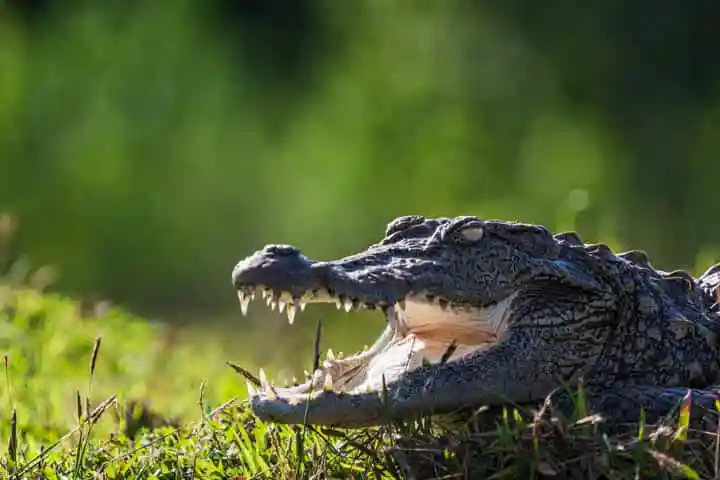

Crocodiles managed to survive the asteroid strike 66 million years ago on the Earth, thanks to their body structure and dietary habits
<p>
<strong>Let&rsquo;s go back in the past, millions of years ago. To be precise 66 million years, when our planet was dominated and controlled by ferocious and awesome creatures called dinosaurs. Then, something untoward happened and the Earth was struck by a massive asteroid, which was more than nine kilometres wide. It crashed in the region what is known today as Mexico, in a shallow sea.</strong></p>
<p>
As per an article in scitechdaily.com, the catastrophe brought in its wake immense damage, resulting in earthquakes at a global scale, bushfires, poisonous rain and tidal waves. What made it worse was the melting of the rocks at the ground zero, causing dust in large quantities to go in the sky, cutting off the sunshine for days and months, plunging the planet in period of <a href="https://scitechdaily.com/how-did-crocodiles-survive-the-asteroid-that-wiped-out-the-dinosaurs/">long, dark, and freezing winter.</a></p>
<p>
Devoid of sunlight, the plants died causing those creatures who depended on them to perish, and along with them the meat-eaters too passed away as their survival depended on the plant-eaters.</p>
<p>
Yet, some living beings managed to survive and tide over these adverse circumstances.</p>
<p>
Among them was surprisingly a group from the dinosaur family itself, those who had wings and flew to distant places to find food. Importantly, the plumage saved them from cold, while the beaks enabled them to reach for seeds that were buried.</p>
<p>
Continuing even till today, these survivors are the birds.</p>
<p>
<strong>Also read: <a href="https://www.indianarrative.com/science-news/did-extinction-of-giant-herbivorous-like-woolly-mammoth-and-giant-bison-lead-to-increase-in-wildfires-131628.html">Did extinction of giant herbivorous like woolly mammoth and giant bison lead to increase in wildfires?</a></strong></p>
<p>
Besides, them, another category of creatures also survived, the crocodiles even though they had no wings or beaks to assist them, they still had skill sets that helped them sail through.</p>
<p>
Foremost, the crocs make use of very little energy. Lying quietly for long, they breathe slowly keeping their heartbeat slow. In fact this what allows them to stay underwater for more than an hour. These attributes help them to go hungry for weeks and months, even more than a year and this proved helpful when the asteroid struck when food was difficult to get.</p>
<p>
On the other hand, dinosaurs, being active required more energy. This was more so in case those whose diet was primarily meat like the Velociraptor, who without food, died fast.</p>
<p>
The places inhabited by dinosaurs were grassland or forest, which meant that with the plants vanishing so did the plant-eaters as did the creatures who were dependent on the plant-eaters like dinosaurs. Crocodiles on the other hand populated lakes, coasts and rivers where green plants are not necessary for survival. The plant and animal material coming from land in the water would have helped the small beings to live and thereby support other larger ones, including the crocodiles.</p>
<p>
<strong>Also read: <a href="https://www.indianarrative.com/science-news/birds-lose-weight-increase-wing-span-in-response-to-climate-change-128460.html">Birds lose weight, increase wing span in response to climate change</a></strong></p>
<p>
Thus, crocodiles living in rivers wouldn&rsquo;t have gone hungry like the land-based dinosaurs when plant life became scarce.</p>
<p>
These factors also aided the small mammals &ndash; the ancestors of human beings &ndash; to survive when the asteroid hit. Eventually they gave rise to all those species we find today on the Earth, including the human beings. Again, being small in size they ate worms and insects, relied on bark and dead leaves and not green plants. Just as well, because these small beings gave rise to present-day humankind!</p>
The India-UK Comprehensive Economic Trade Agreement (CETA) presents unprecedented opportunities for Indian businesses to expand…
External Affairs Minister Dr S Jaishankar spoke to the newly appointed Foreign Minister of South…
The Indian Space Research Organisation (ISRO) is gearing up for a series of exciting missions.…
The India UN Fund has completed the construction of the historic Niangdo dam in Burkina…
The Taiwan Economic and Cultural Representative Office in Japan has strongly condemned political interference during…
Gati Shakti Vishwavidyalaya in Vadodara, which has been largely focused on logistics in the railway,…